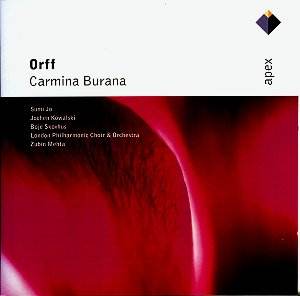In 1937, following the performance of Carmina Burana,
Orff disowned all his previous compositions, though some were eventually
revised and restored. He then explained the unusual background to its
creation: 'Fortune smiled on me when she put into my hands a Würzburg
second-hand books catalogue, in which I found a title that exercised
on me an attraction of frankly magnetic force. It read 'Carmina Burana,
Latin and German songs and poems of a 13th century manuscript'.'
On the front page he found the famous picture of 'Fortune
with her wheel', beneath which was printed the lines: 'O fortuna, velut
luna statu variabilis' ('O fortune, like the moon ever-changing'). This
gave him the inspiration to start his project. What he had stumbled
upon was a poetry of European stature, emanating from England, France,
Spain and Italy. This had been preserved in a monastery, but it is not
self-centred and confessional. Orff said, 'A special feature of the
music is its static construction. In its verse structure there is no
development. A musical formulation, once found, remains the same in
all its repetitions, and the effect depends upon the terseness of the
statement.'
Although the primary conception had been to create
a work for the stage, in fact Carmina has become established into the
choral repertory of the concert hall. In this regard Orff's subtitle
makes an impressive point: 'Secular songs for solo singers and chorus,
with instruments and magical pictures.'
This performance was recorded in 1993 at The Maltings,
Snape. The music brings out the best in Mehta, whose experience at handling
the drama of operatic performances brings a real sense of involvement
and organisation. The recorded sound is a particularly important issue
with this wide-ranging work, and this Apex reissue of Teldec's original
certainly comes up trumps. The extensive percussion is spectacularly
well captured, as for example in the opening climax, when the tam-tam
and timpani can rarely have sounded so thrilling in a recorded performance.
Indeed, the delivery of the climaxes, both in the performance and the
recording, is particularly effective.
The choral forces perform well, not only the LPO Chorus
but also the Southend Boys, whose contribution at 'Tempus est iocundum'
is splendidly committed and energetic. Of the three soloists Sumi Jo
is perhaps the best, always creating an enticing and appealing effect,
which makes a telling impression in the love music, and allows the lyrical
aspect of the work to make its mark. It is no wonder that the chorus
in praise of her beauty, 'Ave formosissima' is sung with such richness
and exaltation.
The baritone Bo Skovhus copes manfully with the cruelly
wide-ranging baritone part, and Jochen Kowalski brings a special quality
to his role imitating a roasting swan. However, there is much to be
gained by forcing a tenor to sing this part in a falsetto voice, as
was Orff's original intention.

![]() Bo Skovhus (baritone),
Jochen Kowalski (alto), Sumi Jo (soprano)
Bo Skovhus (baritone),
Jochen Kowalski (alto), Sumi Jo (soprano) ![]() APEX 09274 13772
(60.27)
APEX 09274 13772
(60.27)